Get on Yer Bike!
by Dawn Copeman
In the eighties the youth of Britain were enticed by Norman
Tebbit to 'get on yer bike' to look for work. While that may or
may not have worked one thing is certain; cycling is now a
popular holiday activity.

Nearly 75% of Britons live within two miles of a bike track.
That means that wherever you are staying in Britain, there will
be somewhere close by where you can go for a ride. There are, in
fact, 10,000 miles of cycle tracks across Britain which together
make up the National Cycle Network. You can cycle the length of
Hadrian's Wall, beat the traffic in central London or go for a
ride through the New Forest. What's more you don't even need to
bring a bike with you; you can hire one here and some companies
will also deliver a hire bike to meet you at the airport or train
station. You can go biking for a few hours, a few days or for a
whole week; the options are endless. So what do you need to know
to get on yer bike and enjoy the country?
Cycle Routes
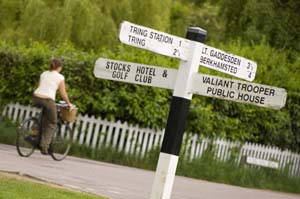 Perhaps the best way to
get started would be to tackle one of the routes on The National
Cycle Network, which is managed by Sustrans. These tracks are on
traffic-free or traffic-calmed roads and pass through some of the
most beautiful countryside in Britain. Sustrans have classified
their tracks into Easy Rides and Long-Distance Rides. All
National Cycle Network Routes are clearly signposted and each
individual track is numbered so that it would be very difficult
to get lost when following one. The other advantage to following
a NCN route is that there are often bike hire facilities and bed
and breakfast accommodation close to each route. Perhaps the best way to
get started would be to tackle one of the routes on The National
Cycle Network, which is managed by Sustrans. These tracks are on
traffic-free or traffic-calmed roads and pass through some of the
most beautiful countryside in Britain. Sustrans have classified
their tracks into Easy Rides and Long-Distance Rides. All
National Cycle Network Routes are clearly signposted and each
individual track is numbered so that it would be very difficult
to get lost when following one. The other advantage to following
a NCN route is that there are often bike hire facilities and bed
and breakfast accommodation close to each route.
Easy Rides are rides that, in theory, can be completed
in a day, but do look carefully at the route description as some
are more challenging than others! Some are short, two to three
mile rides whereas others are thirty miles long. If you are
looking for a short ride, a ride to get some fresh air and
experience the countryside; check out the Easy Rides section at
the Sustrans website.
Long-Distance Rides are routes that will take several days
to cover. Most of these routes are also covered by cycling
holiday operators, so you can have your bike hire and
accommodation sorted out for you before you leave home. These
are challenging rides but they do pass through some glorious
scenery. The most challenging route would have to be the newly
completed Coast to Coast route, or C2C as it is known. This
involves cycling up some steep mountains, and at one point the
route is 609m above sea-level, but the views are magnificent.
However, if you don't fancy any of these routes there are also
several circular routes in each area of the country that have
been devised by local cyclists. I've included some links to help
you find these at the bottom of the article.
Hiring a Bike
You can check out the bike hire shops and sites in the
information section to find a bike hire shop closest to your
intended route, or you can look for the bike hire symbol on your
maps.
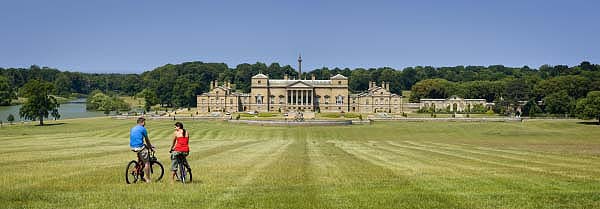
There are a wide variety of bikes available today, but usually in
a bike-hire shop you will be offered one of the following.
- Touring Bike
- Mountain Bike
- Hybrid Bike
- Recumbent Bike
- City Bike
- Tandem
A Touring Bike is a specially designed back for cycle
tours. It is lightweight but strong enough to carry your
luggage. It has lots of gears to cope with varying terrains and
mudguards to try and keep the worst of the dirt off your clothes.
A Mountain Bike has been specially designed to ride
off-road. It has wide tyres and between 21 and 27 gears.
Mountain Bikes do not have a full suspension and are not
comfortable to ride on roads.
A Hybrid Bike is a combination of the best of a mountain
bike and a racing bike. The tyres work equally well on-road or
off-road and the bike has the same number of gears as a mountain
bike. They usually have flat handlebars, mudguards and panniers
for luggage.
A Recumbent Bike is a bike you sit down in to ride! You
sit back in a special chair and the pedals are in front of your
feet. They are more comfortable to ride than a normal bike and
are faster too -- once you've got used to the strange position.
You can hire touring recumbents for long treks and these are
specially designed to cover various terrains and to carry
luggage.
A City bike is a lightweight bike with plenty of gears,
but not as many as on a mountain bike. This type of bike has an
upright position, with flat handlebars and slim tyres to keep you
comfortable on tarmac.
A Tandem is a bike for two. There are various types of
tandems including mountain bikes, hybrids and tricycles.
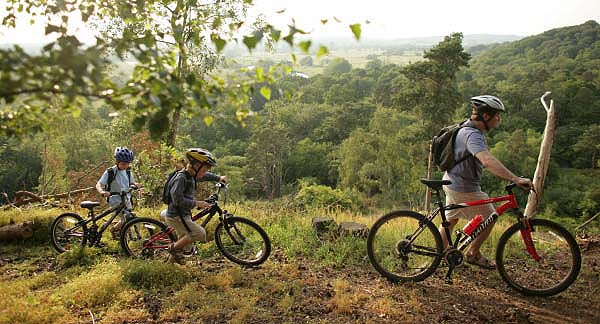
Whatever type of bike you hire, make sure it fits! If the
bike is too big for you, it will be dangerous to ride. Ensure you
can reach the handlebars safely. If you can't, get the fitter to
adjust the saddle until you can safely reach the handlebars and
the pedals. Before you sign on the dotted line, take the
following tests to make sure it fits you.
- City bikes, racing bikes and tandems. Stand
astride the bike with both feet flat on the ground. You should
have at least 1" clearance between yourself and the top tube of
the frame.
- Mountain Bikes: Standing astride
the bike as above, you should have at least 3" clearance between
yourself and the top tube of the frame.
- Children's bikes. Ensure you get the child's bike
properly measured by a qualified fitter.
Cost varies from area to area, but in general the price for a
day's bike hire would be as follows:
- hybrid bike £14
- mountain bike £18
- tandem £25
Cycling Safety Once you've got your bike, you
need to make sure you cycle safely. First of all, ensure you
wear a cycle helmet. Yes, they do look silly, but they have been
proven to save lives. Secondly, make sure you can be seen by
other road users. Wear bright or light coloured clothing even in
daylight, and ideally also attach some reflective material to
your clothes. If you are likely to be on the road at night or in
bad weather, ensure your bike is fitted with lights that work
properly. The Road Vehicles Lighting Regulations 1989 require
that all bikes are fitted with:
- a white front light
- a red rear light
- a red rear reflector
- amber/yellow pedal reflectors
Finally, if you are on the road, ensure you have a good road
position. The latest guidance suggests you ride at least one
metre (3 feet) away from the kerb.
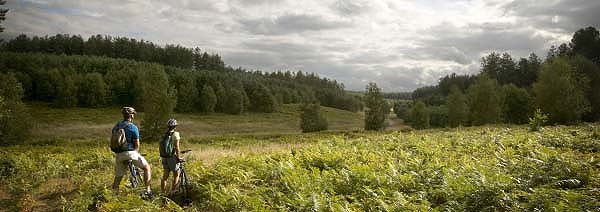
If you are cycling off-road, on a track or a route, then you
will need to observe the country code (see below) and ensure, as
with a walking holiday, that you are prepared for all weathers.
This means taking a first aid kit with you, ensuring you have
adequate food and water supplies for your trip and taking a
working cell phone with you in case of emergencies. Again, as
for walking holidays, make sure someone knows when to expect you
at your next destination.
Cycling Holidays and Events
A variety of companies offer cycling holidays in the UK. These
holidays vary in duration from weekend tours, tours lasting 3 -
4 days, and week-long holidays. As with walking holidays, you can
choose either a self-guided option (in which the company provides
you with the route, books your accommodation and off you go), or
supported holidays in which you will cycle as part of a group.
All offer tours suitable for cyclists of all abilities from
absolute beginners to experienced cyclists. A list of cycle
holiday operators can be found at the bottom of this article.
However, if you don't fancy a long ride, but just want to get out
and about in the fresh air for a few hours, then check out the
Sustrans website for any upcoming cycling events in the area you
will be visiting. Sustrans arranges a variety of cycling events
around the country throughout year, such as the upcoming Bike
Week, which takes place from the 16th - 24th June. Most of these
events are free.
Cycling is good for you and good for the environment. So go on,
do something green on your holiday: see Britain as few other
tourists do and feel good about the fact you're doing your bit to
preserve it for future generations. As the man said: "Get on yer
bike!" You won't regret it.
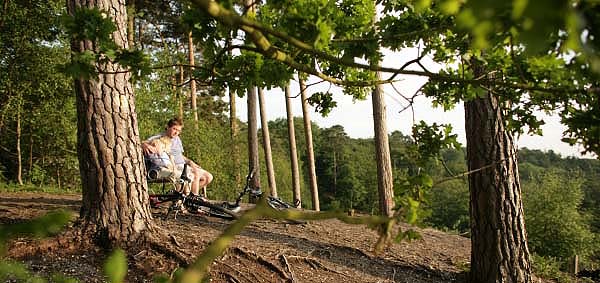
Related Articles:
- Cycling on the Old British Railways, by Liz Hearn
- https://www.timetravel-britain.com/articles/travel/railways.shtml
- A look at four of the best railway corridor cycling routes.
More Information:
We regret that we no longer have the resources to maintain up-to-date links and/or hours and pricing details for the various sites and attractions listed on this website. For more information about the location(s) listed above, please use your favorite search engine or visit Wikipedia.
Dawn Copeman is a freelance writer and commercial writer who has had more than 100 articles published on travel, history, cookery, health and writing. She currently lives in Lincolnshire, where she is
working on her first fiction book. She started her career as a freelance
writer in 2004 and has been a contributing editor for several publications, including TimeTravel-Britain.com and Writing-World.com .
Article © 2007 Dawn Copeman
Photos courtesy of BritainOnView.com
| 